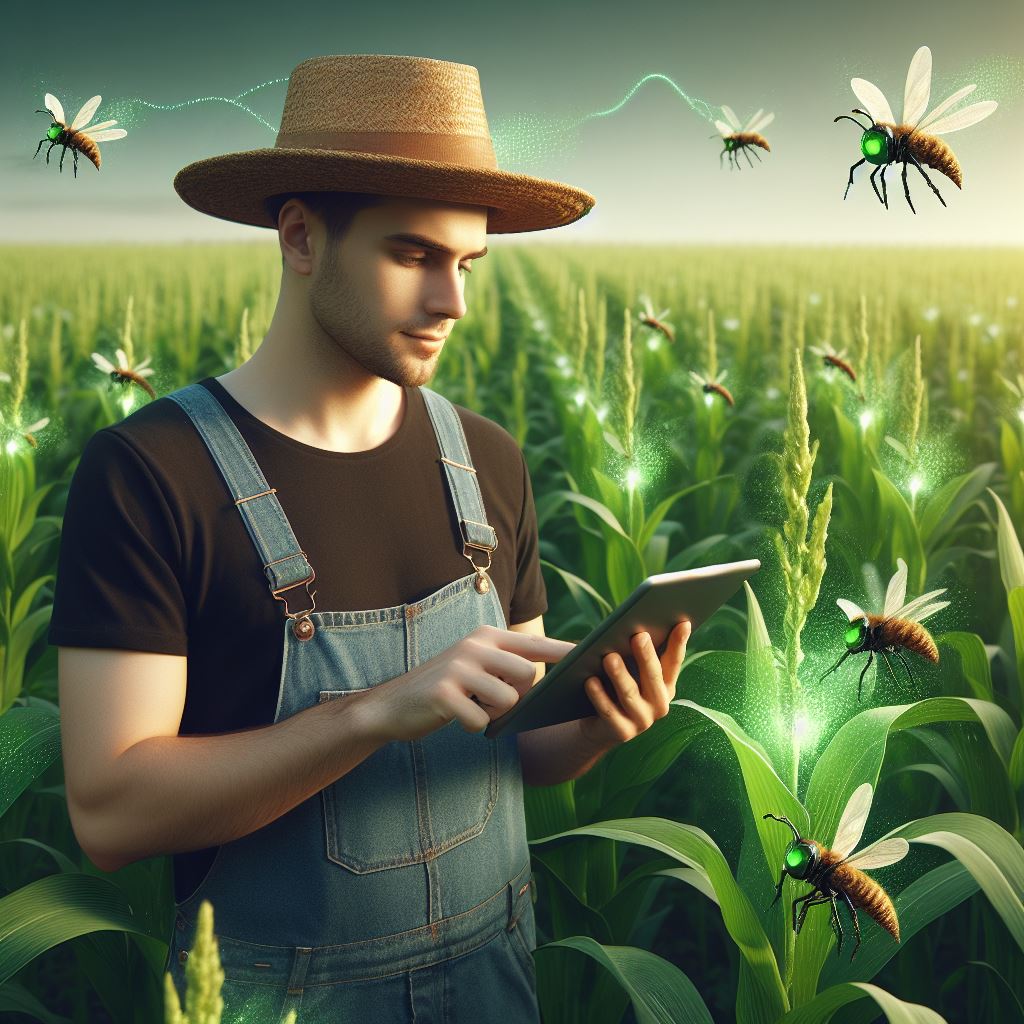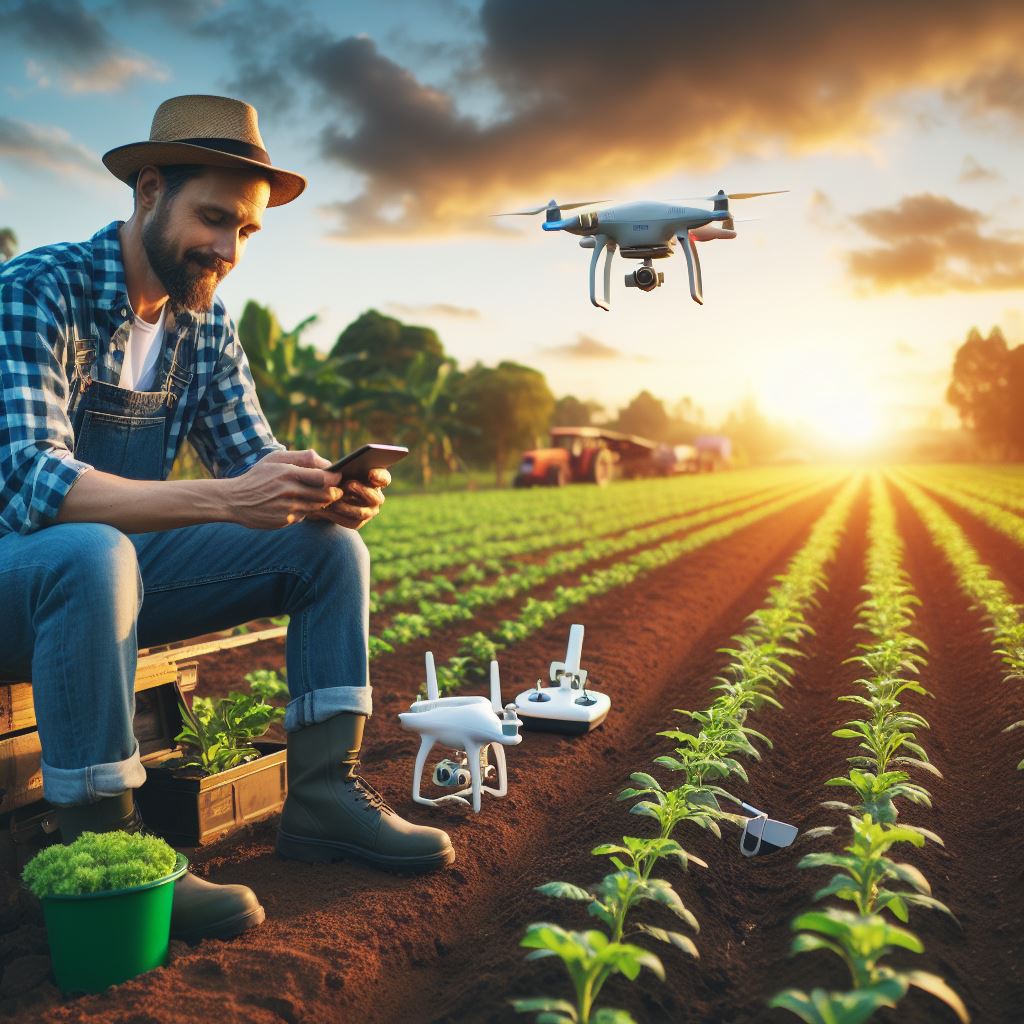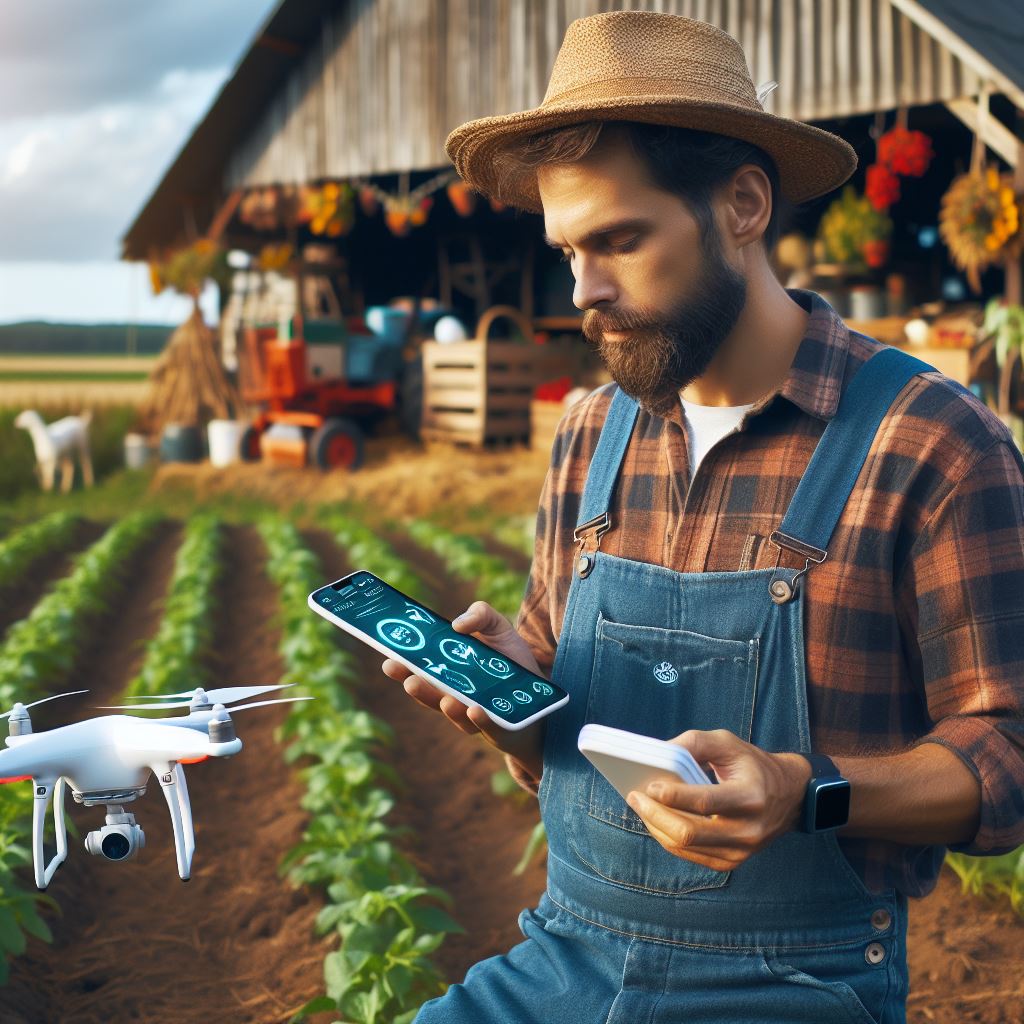Introduction
Nano-tech refers to the manipulation and control of matter at the atomic and molecular levels.
Nano-tech in agriculture is crucial for increasing efficiency, productivity, and sustainability in farming.
In the face of mounting environmental pressures and burgeoning global populations, the imperative for sustainable agriculture has never been more pressing.
Nano-Tech in Farming stands at the vanguard of this movement, offering unprecedented precision, efficiency, and resource conservation.
Through the manipulation of matter at the nanoscale, this cutting-edge technology empowers farmers to mitigate the impacts of climate change, enhance crop yields, and optimize resource utilization in ways previously unimaginable.
As we delve deeper into this realm of innovation, we uncover not only the remarkable potential but also the ethical considerations and practical challenges that accompany such transformative advancements.
Join us as we navigate the intricate landscape of Nano-Tech in Farming, where the fusion of ingenuity and agriculture promises a sustainable tomorrow.
Overview of Nano-Tech in Farming
Definition of Nano-Tech in Farming
Nano-tech in farming refers to the application of nanotechnology in agricultural practices to enhance productivity, sustainability, and efficiency.
Nanotechnology involves manipulating and controlling materials at a molecular or atomic level to create new structures and properties.
In the farming context, nanotechnology aims to improve crop yields, protect plants from pests and diseases, and reduce environmental impact.
Evolution and Development of Nano-Tech in Agriculture
Enhanced Crop Production
Nano-tech in farming has the potential to revolutionize crop production by improving nutrient delivery, increasing photosynthetic efficiency, and enhancing seed quality.
Nanoparticles are used to deliver essential nutrients directly to plants, boosting their growth and vitality.
This targeted approach minimizes resource wastage and ensures optimum nutrient uptake.
Moreover, nanomaterials, such as carbon nanotubes, can enhance photosynthesis through better light utilization, resulting in increased biomass production.
By enhancing plant productivity, nano-tech enables farmers to meet the rising demand for food in a sustainable manner.
Transform Your Agribusiness
Unlock your farm's potential with expert advice tailored to your needs. Get actionable steps that drive real results.
Get StartedPlant Protection
Nano-tech offers farmers novel ways to protect crops from pests, diseases, and stressful environmental conditions.
Nanoparticles can be utilized to develop smart pesticide formulations that target specific pests while minimizing the impact on beneficial organisms and the environment.
This precise delivery system reduces chemical usage, making farming practices more eco-friendly.
Furthermore, nanosensors integrated into plants can detect and respond to early signs of plant stress.
This enables farmers to take preventive measures promptly, preventing yield losses and reducing dependence on agrochemicals.
Soil and Water Management
Nano-tech also plays a vital role in soil and water management, addressing critical challenges in agriculture.
Nanosensors embedded in the soil can monitor moisture levels, nutrient availability, and pH, providing real-time data to farmers.
This information helps optimize irrigation and fertilization practices, preventing overuse or wastage of resources.
Nano-engineered materials, such as absorbent gels and nanoclays, can improve water retention in soil, especially in arid regions.
These materials enhance soil structure, reducing erosion and improving nutrient retention, ultimately boosting crop productivity.
Environmental Sustainability
One of the key advantages of nano-tech in farming is its potential to promote environmental sustainability.
Nano-fertilizers deliver nutrients more efficiently, reducing nutrient runoff and minimizing water pollution.
This ensures that agricultural practices are in line with sustainable development goals.
Additionally, nano-tech enables the development of biodegradable nanomaterials, ensuring minimal environmental impact.
By targeting pest and disease control, nanotechnology reduces the need for synthetic chemicals, preserving biodiversity and ecosystem stability.
In fact, nano-tech in farming offers immense potential to revolutionize agriculture.
Its applications in crop production, plant protection, soil and water management, and environmental sustainability promise increased efficiency, productivity, and sustainability in the agricultural sector.
As nanotechnology continues to evolve, further research and development are needed to harness its full potential and address any associated concerns.
The small but mighty world of nano-tech is poised to transform farming into a more sustainable and productive industry.
Read: Climate Smart Agriculture: Tech Solutions
Applications of Nano-Tech in Farming
Nano-technology has revolutionized various industries, and agriculture is no exception.
The application of nano-tech in farming has shown tremendous potential in advancing crop production, protecting crops, and improving soil management.
Let’s delve into some specific applications of nano-tech in farming:
Crop production and yield enhancement
- Nano-fertilizers: These specially engineered fertilizers have nano-sized particles that enhance nutrient absorption by plant roots. Nano-fertilizers can improve the availability and utilization of nutrients, resulting in increased crop productivity.
- Nano-pesticides: Nano-sized pesticide formulations enable targeted delivery, ensuring effective control of pests while minimizing environmental impact. These nano-pesticides can provide enhanced pest management, reducing crop losses caused by insects, fungi, and weeds.
Crop protection
- Nano-coating for seeds: Nano-coatings on seeds offer multiple benefits. They enhance seed germination rates and seedling growth. Additionally, these coatings provide a protective barrier against pathogens, reducing the incidence of seedborne diseases.
- Nano-sensors for disease detection: Early detection of diseases is crucial for timely interventions and preventing their spread. Nano-sensors equipped with specific antibodies can detect the presence of pathogens or disease-causing agents, allowing farmers to take the necessary preventive measures.
Soil management and conservation
- Nano-remediation of contaminated soils: Soil contamination can limit agricultural productivity. Nano-technology offers a solution by developing nano-scale materials that can break down pollutants in the soil into less harmful substances. This process, known as nano-remediation, helps restore soil health and fertility.
- Nano-sensors for soil moisture management: Efficient irrigation practices are vital for sustainable agriculture. Nano-sensors placed in the soil can monitor soil moisture levels in real-time. This data enables farmers to optimize irrigation schedules, preventing both over-watering and under-watering of crops.
The integration of nano-tech in farming brings numerous benefits. It optimizes resource utilization, minimizes environmental risks, and improves overall farm productivity.
Showcase Your Farming Business
Publish your professional farming services profile on our blog for a one-time fee of $200 and reach a dedicated audience of farmers and agribusiness owners.
Publish Your ProfileHowever, it is essential to address potential concerns associated with the use of nano-materials.
Safety assessments, regulations, and ongoing research are crucial to ensure responsible and sustainable implementation.
In short, the applications of nano-tech in farming are immense.
From crop production and protection to soil management, nano-tech holds great promise for the agriculture industry.
As technology continues to advance, nano-tech will play a significant role in shaping the future of farming, making it more efficient, sustainable, and resilient.
Read: Hydroponics: High-Tech Farming Simplified
Benefits and Advantages of Nano-Tech in Farming
Nano-technology has revolutionized the agricultural sector, bringing forth numerous benefits and advantages that have transformed farming practices.
By utilizing nanotechnology, farmers can enhance crop productivity, improve nutrient uptake, reduce chemical use, achieve better disease and pest control, and efficiently manage water and resources.
Increased Crop Productivity
Nano-particles can be used to develop advanced fertilizers and pesticides, which promote plant growth and increase crop productivity.
These nano-materials improve nutrient absorption, resulting in healthier and more vigorous plants.
Enhanced Nutrient Uptake and Utilization
Nanoscale delivery systems enable the precise release of nutrients to plants, ensuring improved uptake and utilization.
Nano-fertilizers penetrate the plant cells more effectively, providing essential nutrients directly to where they are needed.
Reduction in Chemical Use
Nano-encapsulation of pesticides reduces the quantity of chemicals required for pest control.
These encapsulated pesticides release slowly, targeting specific pests and minimizing negative impacts on beneficial insects, soil, and water sources.
Improved Disease and Pest Control
Nanotechnology enables the development of targeted delivery systems for disease and pest control agents.
Nano-formulations can encapsulate biological control agents, like beneficial bacteria or fungi, ensuring their efficient delivery to the target organisms.
Efficient Water and Resource Management
Nano-sensors and nano-materials help farmers manage water and resources effectively.
Nano-sensors can monitor soil moisture, nutrient levels, and crop health in real-time, enabling precise irrigation and resource allocation.
Nano-materials also improve water retention in soil, reducing the need for frequent irrigation.
In essence, the integration of nanotechnology in farming offers a multitude of benefits and advantages.
The use of advanced nano-fertilizers and pesticides can significantly enhance crop productivity by improving nutrient uptake and utilization.
Moreover, the reduced reliance on chemicals for pest control minimizes environmental harm and promotes sustainable agriculture.
The precise delivery systems enabled by nanotechnology enhance disease and pest control while reducing the use of harmful agents.
Additionally, nano-sensors and materials aid in efficient water and resource management, ensuring optimum utilization.
As technology continues to evolve, nano-tech in farming will pave the way for more sustainable and productive agricultural practices.
Read: Smart Soil Sensors: Boosting Crop Yields

Challenges and Limitations of Nano-Tech in Farming
Safety concerns and potential risks
- Nano-particles in agriculture raise safety concerns due to their potential effects on human health.
- The tiny size of nano-particles might enable them to be easily inhaled or absorbed through the skin.
- Long-term exposure to nano-particles could lead to adverse health effects, such as organ damage or toxicity.
- Although research is ongoing, a comprehensive understanding of the potential risks associated with nano-tech in farming is still lacking.
- Addressing safety concerns is crucial to ensure the responsible deployment of nano-tech in agricultural practices.
Ethical Considerations of using nano-tech in Agriculture
- The use of nano-tech in farming raises ethical questions regarding its impact on the environment and ecosystems.
- Concerns revolve around unintended consequences that may arise from manipulating natural processes at the nano-scale.
- There is a need to carefully evaluate the long-term effects of nano-tech on biodiversity and ecological balance.
- Additionally, the potential unequal distribution of benefits and risks needs to be taken into account.
- Open dialogue and ethical frameworks are essential to ensure the responsible and equitable application of nano-tech in agriculture.
Regulatory hurdles and approval process
- The introduction of nano-tech in farming requires clear regulatory guidelines and approval processes to address its unique challenges.
- Current regulations may not adequately cover nano-specific risks and considerations, necessitating specific guidelines.
- Regulatory bodies need to establish appropriate safety testing methodologies for nano-tech in agriculture.
- The approval process should ensure transparency, stakeholder involvement, and thorough risk assessments.
- Collaboration between regulatory agencies, scientists, and industry stakeholders is crucial to develop effective regulations for nano-tech in farming.
In brief, while nano-tech holds great promise for revolutionizing agriculture, challenges and limitations need to be addressed for its successful implementation.
Safety concerns surrounding nano-particles and their potential risks to human health require extensive research and precautionary measures.
Ethical considerations regarding environmental impact and equitable distribution of benefits and risks call for responsible and transparent decision-making processes.
Regulatory hurdles must be overcome through the establishment of clear guidelines and robust approval processes specific to nano-tech farming applications.
By navigating these challenges, nano-tech can undoubtedly contribute significantly to sustainable and efficient agricultural practices.
Read: Robotic Farm Hands: The New Agri Trend
Current and Future Research in Nano-Tech and Farming
Ongoing studies and experiments
- Researchers are actively investigating the use of nanotechnology in various aspects of farming.
- One ongoing study focuses on developing nanosensors to monitor soil health and nutrient levels.
- Another experiment explores the potential of nanomaterials to improve crop yield and resistance to pests.
- Scientists are also working on nanobots that can deliver targeted nutrients directly to plant cells.
- These studies aim to optimize agricultural practices, reduce environmental impact, and increase food production.
Potential future advancements and possibilities
- Nano-Tech could revolutionize the way we grow and cultivate crops, offering numerous possibilities.
- Nanoscale sensors could enable real-time monitoring of plant health, leading to early disease detection.
- Smart nanomaterials could enhance soil water retention, reducing the need for irrigation and conserving water.
- Nanosystems might enable precision delivery of pesticides, reducing their usage and minimizing harm to beneficial organisms.
- Development of nanoscale robots capable of performing delicate tasks in agriculture is on the horizon.
Collaboration between researchers, farmers, and industries
- Close collaboration among researchers, farmers, and industries is essential for successful integration of nanotechnology in farming.
- Researchers can gain valuable insights from farmers by understanding their needs and challenges.
- Farmers can benefit from sharing their practical knowledge, aiding researchers in developing effective nano-solutions.
- Industries play a crucial role in providing resources, funding, and infrastructure to facilitate nano-tech implementation in agriculture.
- Collaboration ensures that nano-tech solutions are tailored to meet the specific requirements of farmers and the industry.
Overall, current research in nano-tech and farming is driving remarkable advances that have the potential to transform agriculture.
Ongoing experiments explore nanosensors, nanomaterials, and nanobots, aiming to improve soil health, crop yield, and nutrient delivery.
In the future, nanotechnology could enable real-time plant monitoring, enhance water retention, and precise pesticide application.
However, the successful integration of nano-tech into farming requires collaboration between researchers, farmers, and industries to ensure tailored solutions that address real-world agricultural challenges.
The marriage of nano-tech and farming is indeed small but mighty, promising a greener and more productive future for agriculture.
Explore Further: Agri IoT: Smart Solutions for Farmers
Conclusion
In this blog post some of the key points discussed include:
- Nano-tech in farming is a powerful and promising technology.
- It offers numerous benefits like increased crop yields, reduced pesticide use, and enhanced resource efficiency.
- Nanomaterials have been used in various applications such as nano-fertilizers, nanosensors, and nanopesticides.
- The use of nano-tech in agriculture can help address global food security challenges and contribute to sustainable farming practices.
Nano-tech has the potential to revolutionize the agriculture industry, improving productivity and sustainability.
Showcase Your Farming Business
Publish your professional farming services profile on our blog for a one-time fee of $200 and reach a dedicated audience of farmers and agribusiness owners.
Publish Your ProfileIts precision and efficiency can lead to optimized crop growth, reduced environmental impact, and increased profits for farmers.
By harnessing the power of nanotechnology, we can create a more resilient and efficient food production system.
Continued research and development in nano-tech is essential to unlock its full potential.
Collaborations between scientists, farmers, and policymakers are needed to ensure responsible and safe use of nano-tech in farming.
Government support and funding can accelerate the adoption of nano-tech in agriculture, benefiting both farmers and society as a whole.
Nano-tech offers promising solutions to the challenges faced by the agriculture industry.
Its transformative potential, when harnessed responsibly, can revolutionize farming practices, leading to increased productivity, sustainability, and food security.
It is crucial for researchers, farmers, and policymakers to embrace and explore the full adoption of nano-tech in agriculture to pave the way for a more efficient and resilient food system.




